|
Books Should Be Free Loyal Books Free Public Domain Audiobooks & eBook Downloads |
|
|
Books Should Be Free Loyal Books Free Public Domain Audiobooks & eBook Downloads |
|
Essay/Short Nonfiction |
|---|
|
Book type:
Sort by:
View by:
|
By: Charles Dickens | |
|---|---|
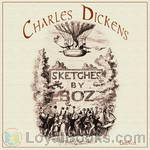 Sketches by Boz: Illustrative of Every-Day Life and Every-Day People
Sketches by Boz: Illustrative of Every-Day Life and Every-Day People
"Sketches by "Boz," Illustrative of Every-day Life and Every-day People (commonly known as Sketches by Boz) is a collection of short pieces published by Charles Dickens in 1836 accompanied by illustrations by George Cruikshank. The 56 sketches concern London scenes and people and are divided into four sections: "Our Parish", "Scenes", "Characters", and "Tales". The material in the first three of these sections is non-fiction. The last section comprises fictional stories. Originally, the sketches were published in various newspapers and periodicals from 1833-1836." | |
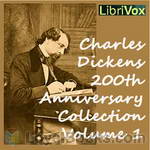 Charles Dickens 200th Anniversary Collection Vol. 1
Charles Dickens 200th Anniversary Collection Vol. 1
The Charles Dickens 200th Anniversary Collection comprises short works - fiction, essays, poetry, letters, magazine articles and speeches - and each volume will be a pot pourri of all genres and periods of his writing. This first volume is released on Dickens' 200th birthday, February 7th 2012. Further volumes will follow during the anniversary year.Volume 1 includes short stories including, amongst others, The Holly Tree, the first part of Holiday Romance and three pieces from Mugby Junction.Some... | |
 The Uncommercial Traveller
The Uncommercial Traveller
The Uncommercial Traveller is a collection of literary sketches and reminiscences written by Charles Dickens. In 1859 Dickens founded a new journal called All the Year Round and the Uncommercial Traveller articles would be among his main contributions. He seems to have chosen the title and persona of the Uncommercial Traveller as a result of a speech he gave on the 22 December 1859 to the Commercial Travellers' School London in his role as honorary chairman and treasurer. The persona sits well with a writer who liked to travel, not only as a tourist, but also to research and report what he found; visiting Europe, America and giving book readings throughout Britain... | |
By: Charles Mackay (1814-1889) | |
|---|---|
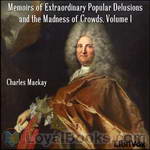 Memoirs of Extraordinary Popular Delusions and the Madness of Crowds
Memoirs of Extraordinary Popular Delusions and the Madness of Crowds
The book chronicles and vilifies its targets in three parts: “National Delusions”, “Peculiar Follies”, and “Philosophical Delusions”.The subjects of Mackay’s debunking include alchemy, beards (influence of politics and religion on), witch-hunts, crusades and duels. Present day writers on economics, such as Andrew Tobias, laud the three chapters on economic bubbles. | |
By: Charles MacLaurin (1872-1925) | |
|---|---|
 Post Mortem: Essays, Historical And Medical
Post Mortem: Essays, Historical And Medical
This 1922 collection of extensive essays comprises well written biographies of a few famous folk. The life narratives include analyses of medical and/or psychological elements in each person’s life. Biographies include Anne Boleyn, Jeanne D’Arc, The Empress Theodora, The Emperor Charles V, Don John Of Austria, Cervantes, Don Quixote , Philip II, Mr. and Mrs. Pepys, Edward Gibbon, Jean Paul Marat, Napoleon I, and Benvenuto Cellini. It concludes with an extended meditation on death. “But there... | |
By: Charles McRae | |
|---|---|
 Fathers of Biology
Fathers of Biology
An account given of the lives of five great naturalists (Hippocrates, Aristotle, Galen, Vesalius and Harvey) will not be found devoid of interest. The work of each one of them marked a definite advance in the science of Biology. There is often among students of anatomy and physiology a tendency to imagine that the facts with which they are now being made familiar have all been established by recent observation and experiment. But even the slight knowledge of the history of Biology, which may be obtained from a perusal of this little book, will show that, so far from such being the case, this branch of science is of venerable antiquity... | |
By: Charles W. Diffin (1884-1966) | |
|---|---|
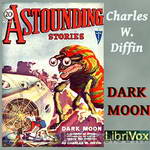 Dark Moon
Dark Moon
Mysterious, dark, out of the unknown deep comes a new satellite to lure three courageous Earthlings on to strange adventures. | |
By: Charles Willard Diffin (1884-1966) | |
|---|---|
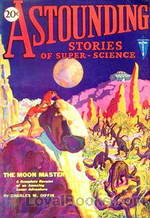 Moon Master
Moon Master
Through Infinite Deeps of Space Jerry Foster Hurtles to the Moon—Only to be Trapped by a Barbaric Race and Offered as a Living Sacrifice to Oong, their Loathsome, Hypnotic God. | |
By: Chesterton, G. K. | |
|---|---|
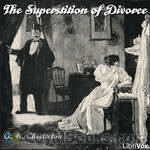 The Superstition of Divorce
The Superstition of Divorce
This short book was written in 1920, and in it Chesterton, with his usual wit and incisive logic, presents a series of articles defending marriage and indicating the weaknesses in divorce. He did this 16 year before the first Christian denomination in the world allowed it’s members to divorce. Till then Christendom was unanimous in standing against it. Chesterton saw clearly the trends of this time, and delivered this defense. | |
By: Christopher Morley (1890-1957) | |
|---|---|
 Mince Pie
Mince Pie
Mince Pie is a compilation of humorous sketches, poetry, and essays written by Christopher Morley. Morley sets the tone in the preface: "If one asks what excuse there can be for prolonging the existence of these trifles, my answer is that there is no excuse. But a copy on the bedside shelf may possibly pave the way to easy slumber. Only a mind "debauched by learning" (in Doctor Johnson's phrase) will scrutinize them too anxiously." | |
 Pipefuls
Pipefuls
A delightful collection of 48 essays on various topics of the human condition that caught his fancy. Witty, insightful and funny of course and on occasion thought provoking and even disturbing. From the preface "These sketches gave me pain to write; they will give the judicious patron pain to read; therefore we are quits. I think, as I look over their slattern paragraphs, of that most tragic hour—it falls about 4 p. m. in the office of an evening newspaper—when the unhappy compiler tries to round up the broodings of the day and still get home in time for supper... | |
 Religio Journalistici
Religio Journalistici
The great Canadian journalist and humorist ruminates and reflects upon his life and calling in this 1924 little gem. - Summary by david wales | |
 Shandygaff
Shandygaff
A number of most agreeable Inquirendoes upon Life & Letters, interspersed with Short Stories & Skits, the whole most Diverting to the Reader. SHANDYGAFF: a very refreshing drink, being a mixture of bitter ale or beer and ginger-beer, commonly drunk by the lower classes in England, and by strolling tinkers, low church parsons, newspaper men, journalists, and prizefighters. Said to have been invented by Henry VIII as a solace for his matrimonial difficulties. It is believed that a continual bibbing of shandygaff saps the will, the nerves, the resolution, and the finer faculties, but there are those who will abide no other tipple... | |
 Modern Essays
Modern Essays
Thirty three essays by more or less well-known authors of Britain, the United States, and Canada, each fronted by an introductory paragraph. Early twentieth or late nineteenth centuries. “I think I can offer you, in this parliament of philomaths [lover of learning], entertainment of the most genuine sort;…as brilliant and sincere work is being done to-day in the essay as in any period of our literature. Accordingly the pieces reprinted here are very diverse. There is the grand manner; there is foolery; there is straightforward literary criticism; there is pathos, politics, and the picturesque... | |
By: Clarence Darrow (1857-1938) | |
|---|---|
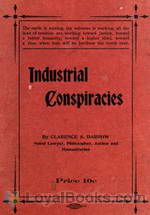 Industrial Conspiracies
Industrial Conspiracies
| |
By: Clayton Hamilton (1881-1946) | |
|---|---|
 Problems of the Playwright
Problems of the Playwright
A third volume of essays by American critic Clayton Hamilton, published as a companion piece to The Theory of the Theatre & Studies in Stagecraft, and focusing on the problems of the playwright. | |
 Studies in Stagecraft
Studies in Stagecraft
A companion piece to Hamilton's earlier work, The Theory of the Theatre. Where that volume dealt with the criticism of dramatic art in general, this volume focuses more specifically on the contemporary drama of the era in which it was written. - Summary by Andrew Gaunce | |
By: Coningsby Dawson (1883-1959) | |
|---|---|
 It Might Have Happened to You
It Might Have Happened to You
This is a frank eyewitness description of the suffering, starvation in particular, that was widely experienced in Central and Eastern Europe in the aftermath of "The Great War". “It is not stating matters too strongly to say that…peace had caused at least as much misery as the four years’ fury of embattled armies.” It is a powerful political and anti-war statement with scant mention of any battle. – Lee Smalley | |
By: D. B. Casteel (1877-1958) | |
|---|---|
 Behavior of the Honey Bee in Pollen Collecting
Behavior of the Honey Bee in Pollen Collecting
The value of the honey bee in cross pollinating the flowers of fruit trees makes it desirable that exact information be available concerning the actions of the bee when gathering and manipulating the pollen. The results recorded in this manuscript are also of value as studies in the behavior of the bee and will prove interesting and valuable to the bee keeper. The work here recorded was done by Dr. Casteel during the summers of 1911 and 1912. | |
By: Dame Shirley (d.1906) | |
|---|---|
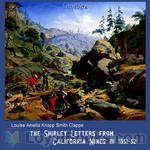 The Shirley Letters from California Mines in 1851-52
The Shirley Letters from California Mines in 1851-52
Louise Amelia Knapp Smith Clappe moved to California from Massachusetts during the Gold Rush of the mid-1800’s. During her travels, Louise was offered the opportunity to write for The Herald about her travel adventures. It was at this point that Louise chose the name “Shirley” as her pen name. Dame Shirley wrote a series of 23 letters to her sister Mary Jane (also known as Molly) in Massachusetts in 1851 and 1852. The “Shirley Letters”, as the collected whole later became known, gave true accounts of life in two gold mining camps on the Feather River in the 1850s... | |
By: Dante Alighieri (1265-1321) | |
|---|---|
 Vulgari Eloquentia
Vulgari Eloquentia
De vulgari eloquentia (On Eloquence in the vernacular) is a short essay written by Dante Alighieri in Latin. The work remains incomplete; only one and a half books are extant. It is believed to have been composed during Dante's exile, probably at some point between 1302 and 1305. The work revolves around the relationship between Latin and vernacular, and the need for a literary language, with an excourse on the poetic forms in vernacular. | |
By: David Hilbert (1862-1943) | |
|---|---|
 Mathematical Problems
Mathematical Problems
Lecture delivered before the International Congress of Mathematicians at Paris in 1900 and subsequently published in the Bulletin of the American Mathematical Society Vol. 8 (1902), 479-481. | |
By: Douglas Fairbanks (1883-1939) | |
|---|---|
 Laugh and Live
Laugh and Live
Douglas Fairbanks, Sr. (May 23, 1883 – December 12, 1939) was an American actor, screenwriter, director and producer. He was best known for his swashbuckling roles in silent films such as The Thief of Baghdad, Robin Hood, and The Mark of Zorro. His book, Laugh and Live, is a book about positive virtues and advice for leading a good, healthy, and successful life. An advisory about this book is in order. Published in 1917, it was written at a time when “men went to work, women kept house, and supported their man”... | |
By: Dr. Benjamin Rush (1746-1813) | |
|---|---|
 Inquiry into the Effects of Ardent Spirits upon the Human Body and Mind, with an Account of the Means of Preventing, and of the Remedies for Curing Them
Inquiry into the Effects of Ardent Spirits upon the Human Body and Mind, with an Account of the Means of Preventing, and of the Remedies for Curing Them
Written when the United States extended only to the Mississippi River, by one of the signers of the Declaration of Independence, this short work explores the physical, social, and mental effects of distilled liquors; the classes of people prone to intoxication by them; suggested drinks to use instead of them; and remedies for intoxication and for their habitual use. He takes a medical view of alcoholism, exploring the physical causes rather than blaming moral failure as the cause. Alcoholic drinks that are not distilled are viewed as wholesome drinks, and opium is suggested for pain as being without bad effects or addictive qualities. | |
By: Dreiser, Theodore (1871-1945) | |
|---|---|
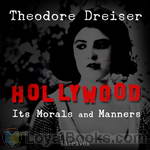 Hollywood: Its Morals and Manners
Hollywood: Its Morals and Manners
Serialized in Shadowland from November 1921 to February 1922, Hollywood: Its Morals and Manners is Theodore Dreiser's shocking four part expose on the motion picture industry. In it, he shares his observations from his extended stay in Los Angeles, and gives us an intimate look at the seedier underside of Hollywood. | |
By: E. Walter Walters | |
|---|---|
 Confessions of a Book-Lover
Confessions of a Book-Lover
"I am of the company of book men who read simply for the love of it," confesses E. Walter Walters, in this gently written tome. Walters documents his habit of "book fishing--" seeking and finding quality volumes in the discount binds at his booksellers, and as a connoisseur of wine might match varieties with courses, he matches his books with the contexts in which he reads them--in the garden, in the bedroom, with friends. He also provides a list of his favorite authors and favorite books, as well as favorite characters from the books he has read, not in a way to impose his choices on other readers, but to share his own personal experiences. | |
By: editor: Frank Munsey | |
|---|---|
 The Scrap Book Sampler
The Scrap Book Sampler
18 works -- two non-fic articles & one short fiction or poetry each -- from issues March, April, May, June, July, & August 1906 of The Scrap Book, Volume 1, edited by Frank Munsey. As he states in the editorial of the April 1906 issue (Vol 1, Iss 2) this was a sort of supplement to the editor's popular monthly, Munsey's Magazine. The Scrap Book is very like an American version of Punch with many short, often humorous articles interspersed with at least one short story, some poetry, and several longer non-fic pieces. The Scrap Book ran up to 1922. | |
By: Edmund Gosse | |
|---|---|
 Gossip in a Library
Gossip in a Library
A collection of informal essays about books in his library. He combines commentary, translations, and humorous asides about authors and their subjects. | |
By: Edward Carpenter (1844-1929) | |
|---|---|
 Homogenic Love and Its Place in a Free Society
Homogenic Love and Its Place in a Free Society
This pamphlet by LGBT pioneer and philosopher Edward Carpenter was originally intended to form part of his work "Love's Coming of Age", but was removed following public discourse on the Oscar Wilde trials of 1895. It was subsequently published privately and circulated among his inner circle. This is Carpenter's first publication on the subject of homosexuality, and displays his typical forward-thinking and utopian sentiments. It seeks to make clear that homosexuality is innate, is more widespread than generally accepted, and even implies that degress of bisexuality may be universal. - Summary by Jake Malizia | |
By: Elbert Hubbard (1856-1915) | |
|---|---|
 Mintage
Mintage
Elbert Hubbard is best known as the author of the "Little Journeys To The Homes of Famous People". These 11 short stores show the side of him that celebrated caring, friendship love among humans. The first describes how 5 frightened orphan children from a foreign country were cared for on a railroad journey of a thousand miles; all by strangers without any planning and without a word of English being spoken or needed. He observed caring human men and women of all ages doing whatever was necessary to see they reached their destination in whatever comfort could be provided... | |
By: Emma Goldman (1869-1940) | |
|---|---|
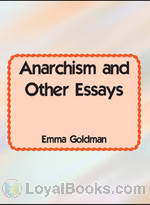 Anarchism and Other Essays
Anarchism and Other Essays
Chicago, May 4, 1886. In the Haymarket region of the city, a peaceful Labor Day demonstration suddenly turns into a riot. The police intervene to maintain peace, but they soon use violence to quell the mob and a bomb is thrown, resulting in death and injuries to scores of people. In the widely publicized trial that followed, eight anarchists were condemned to death or life imprisonment, convicted of conspiracy, though none of them had actually thrown the bomb. A young Russian immigrant, Emma Goldman, had arrived just the previous year in the United States... | |
By: Étienne de La Boétie (1530-1563) | |
|---|---|
 Anti-Dictator: The Discours sur la servitude voluntaire
Anti-Dictator: The Discours sur la servitude voluntaire
Étienne de La Boétie was the closest friend of Michel de Montaigne and the subject of the latter's famous essay "On Friendship." Here, however, he tackles a different, more impersonal relationship: that of ruler and ruled. The argument in this work is encapsulated in this quote: "A people enslaves itself, cuts its own throat, when, having a choice between being vassals and being free men, it deserts its liberties and takes on the yoke, gives consent to its own misery, or, rather, apparently welcomes it... | |